Qualitative characteristics of the volunteer movement
of the Belgorod region
The study of the regional specifics of the implementation of volunteer activities is relevant for several reasons. Firstly, the analysis carried out in the article made it possible to identify and consider the qualitative characteristics of the volunteer movement in the Belgorod region, reflecting its motivational profile, the nature of engagement, and the degree to which the population's expectations of volunteerism are realized. Secondly, the study showed some trends, which are important for infrastructural entities to take into account and understand in order to expand volunteer practices in the territory. The analysis is based on the results of a mass survey of 700 volunteer activists from 22 municipalities of the Belgorod Region over the age of 14, as well as 121 organizers of volunteer activities in the region. The empirical data obtained demonstrate the predominantly pragmatic nature of the initial motivation of volunteers, whose activities are highly sporadic, but as they gain experience, this allows them to strengthen the moral and altruistic foundations of their activities and justify their expectations. The region is dominated by formal volunteerism, primarily through the public sector (youth policy and educational institutions). This makes it important to establish a social partnership with civil non-profit organisations, whose self-organisational potential is currently underutilised.
Figures
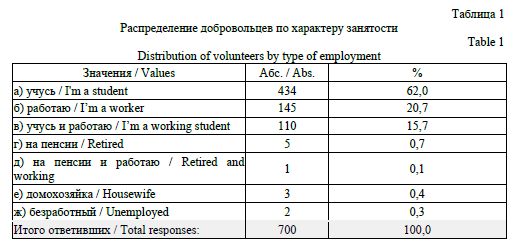
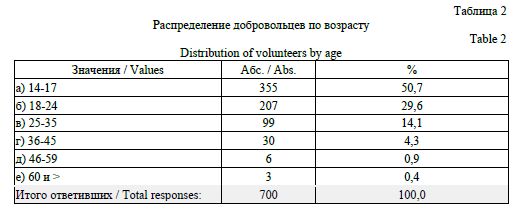
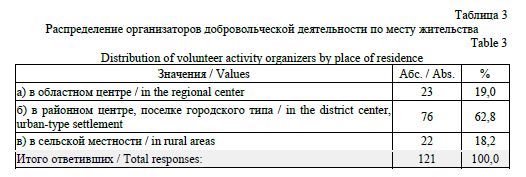
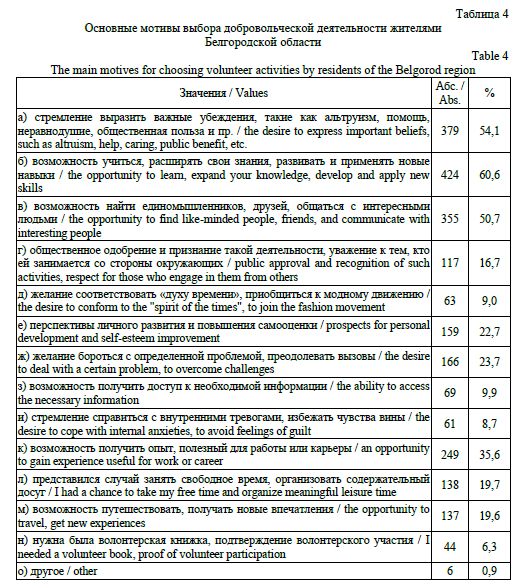
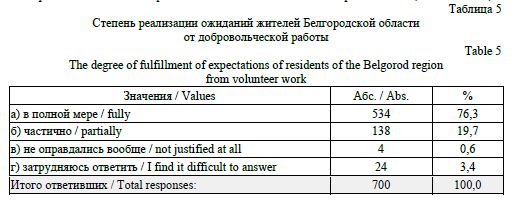



Kisilenko, A. V. (2025), “Qualitative characteristics of the volunteer movement of the Belgorod region”, Research Result. Sociology and Management, 11 (2), 120-135, DOI: 10.18413/2408-9338-2025-11-2-0-8.


















While nobody left any comments to this publication.
You can be first.
Ermilova, A. V., Isakova, I. A., Ignatieva, V. I. (2018), “Regional problem field of volunteering”, Vestnik Nizhegorodskogo universiteta im. N. I. Lobachevskogo. Seriya: Sotsialnye nauki, 2 (50), 88-97, EDN: UXAPYH. (In Russian)
Isaeva, Е. А. (2013), “Attempts to Bring the Russian Volunteering Institute under control of State: Analysis of the Draft of a Bill «On Volunteering»”, Vlast’, (10), 148-150, EDN: RKWQPT. (In Russian)
Kiselev, I. Yu. (2013), “Volunteering as Social Capital”, Vestnik Sotsialno-politicheskih nauk, 12, 53-61, EDN: ROBQKV. (in Russian)
Kislyakov, P. A., Shmeleva, E. A. and Gowin, O. (2019), “Contemporary volunteering in the formation of prosocial behaviour of a person”, Obrazovanie i nauka, 6 (21), 122-145, DOI: 10.17853/1994-56392019-6-122-145, EDN: GJYYMC. (in Russian)
Krasnopolskaya, I. I., Guseva, P. D., Meis, L. and Knaan, R. (2022), “Satisfaction Factors for Episodic Volunteers”, Monitoring obshhestvennogo mneniya:jekonomicheskie i sotsialnye peremeny, (2), 384-408, DOI: 10.14515/monitoring.2022.2.2113, EDN: RCYDOR. (In Russian)
Korneeva, I. E. (2013), “Volunteer activities of St. Petersburg residents: determinants of engagement”, in Negosudarstvennye nekommercheskie organizatsii v Sankt-Peterburge 2013: informatsionno-analiticheskie materialy o deyatelnosti negosudarstvennyh nekommercheskih organizatsiy [Non-governmental non-profit organizations in St. Petersburg 2013: information and analytical materials on the activities of non-governmental non-profit organizations], St. Petersburg, Russia, 67-75. (In Russian)
Mersiyanova, I. V. (2019), Na smenu klassicheskomu volonterstvu prikhodit epizodicheskoe. Chto eto takoe i plokho li eto? [Classic volunteering is being replaced by episodic volunteering. What is it and is it bad?], [Online], available at: https://office-nko.ru/2019/09/25/na-smenu-klassicheskomu-volonterstvu-prihodit-epizodicheskoe-chto-eto-takoe-i-ploho-li-eto/ (Accessed 08 December 2024). (In Russian)
Оvsii, V. V. (2021), Molodezhnoe volonterstvo v sovremennoy Rossii: osobennosti formirovaniya i perspektivnye napravleniya razvitiya [Youth volunteerism in modern Russia: features of formation and promising areas of development], Foundation for Science and Education, Rostov-on-Don, Russia, DOI: 10.18522/2227-8656.2021.2.8, EDN: LPQHSO. (In Russian)
Starshinova, A. V. (2019), “Contradictions of students’ motivation for participation in the activities of voluntary organisations”, Obrazovanie i nauka, 21 (10), 143-166, DOI: 10.17853/1994-5639-2019-10-143-166, EDN: BYLXZC. (In Russian)
Tarasova, A. N., Pevnaya, M. V. and Telepaeva, D. V. (2022), “Self-regulation of youth
volunteer activities or factors of non-participation of young volunteers in social projects”, Research Result. Sociology and management, 8 (3), 155-171, DOI: 10.18413/2408-9338-2022-8-3-0-11, EDN: SRBTJE. (In Russian)
Filippova, T. I., Khachikyan, E. I., Patsakula, I. I. and Ivanona, I. V. (2021), “Volunteering in Russian regions: socio-psychological features, problems of realization and its solution”, Vestnik universiteta, (2), 166-174, DOI: 10.26425/1816-4277-2021-2-166-174, EDN: EIDPPQ. (In Russian)
Yanitsky, О. N. (2014), “Volunteers: civil and government”, Sotsiologicheskaya nauka i Sotsialnaya praktika, 1 (5), 71-89, EDN: SHRAZH. (In Russian)
Clary, E. G., Snyder, M., Ridge, R. D., Copeland, J., Stukas, A. A., Haugen, J., & Miene, P. (1998), “Understanding and assessing the motivations of volunteers”, Journal of Personality and Social Psychology, (74), 1516-1530.
Clary, E. G. & Snyder, M. (1999), “The Motivations to Volunteer: Theoretical and Practical Considerations”, Current Directions in Psychological Science, 8(5), 156-159.
The reported study was funded by RFBR and EISR according to the research project № 21-011-31697 “Risks of volunteering: reflexive scenarios of regional community”.